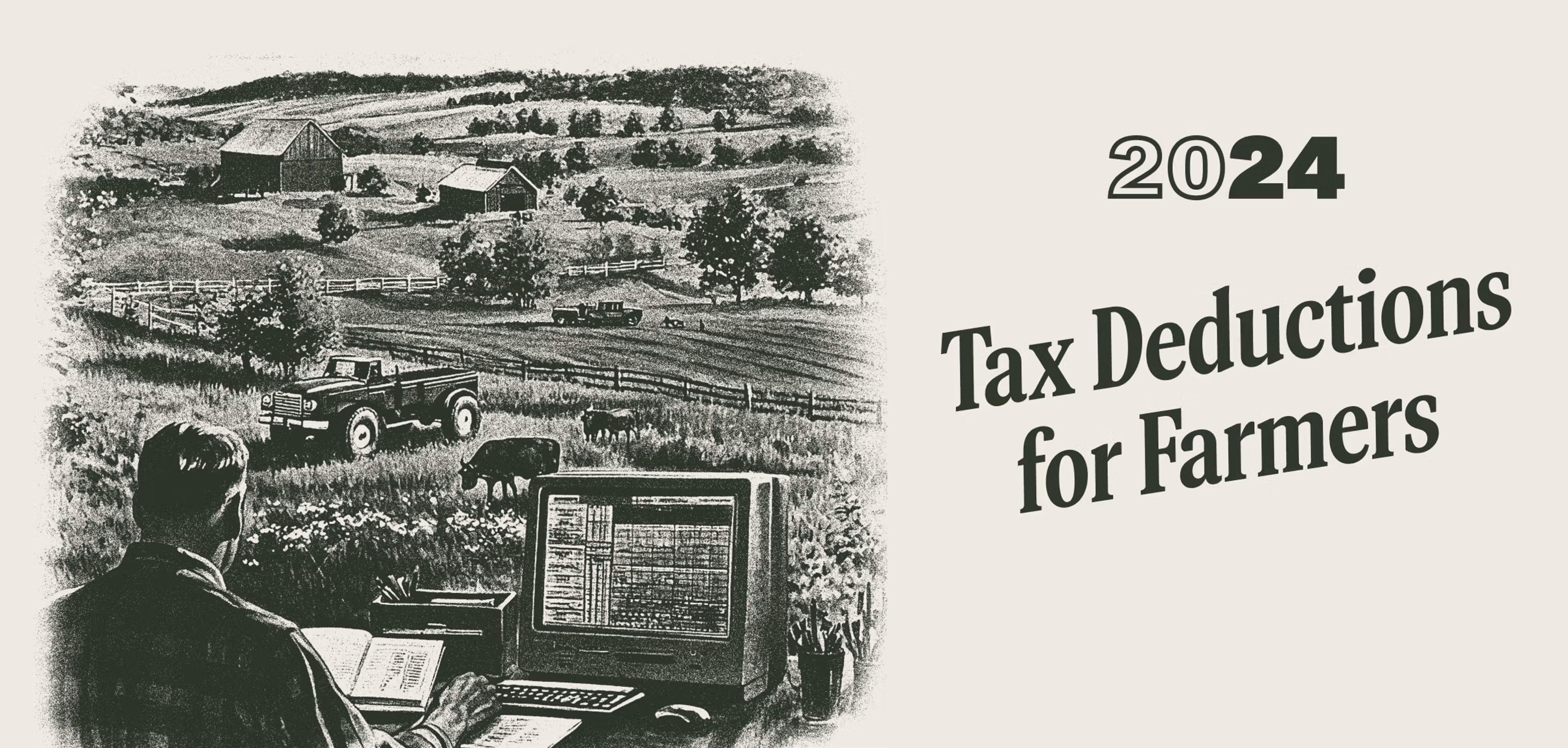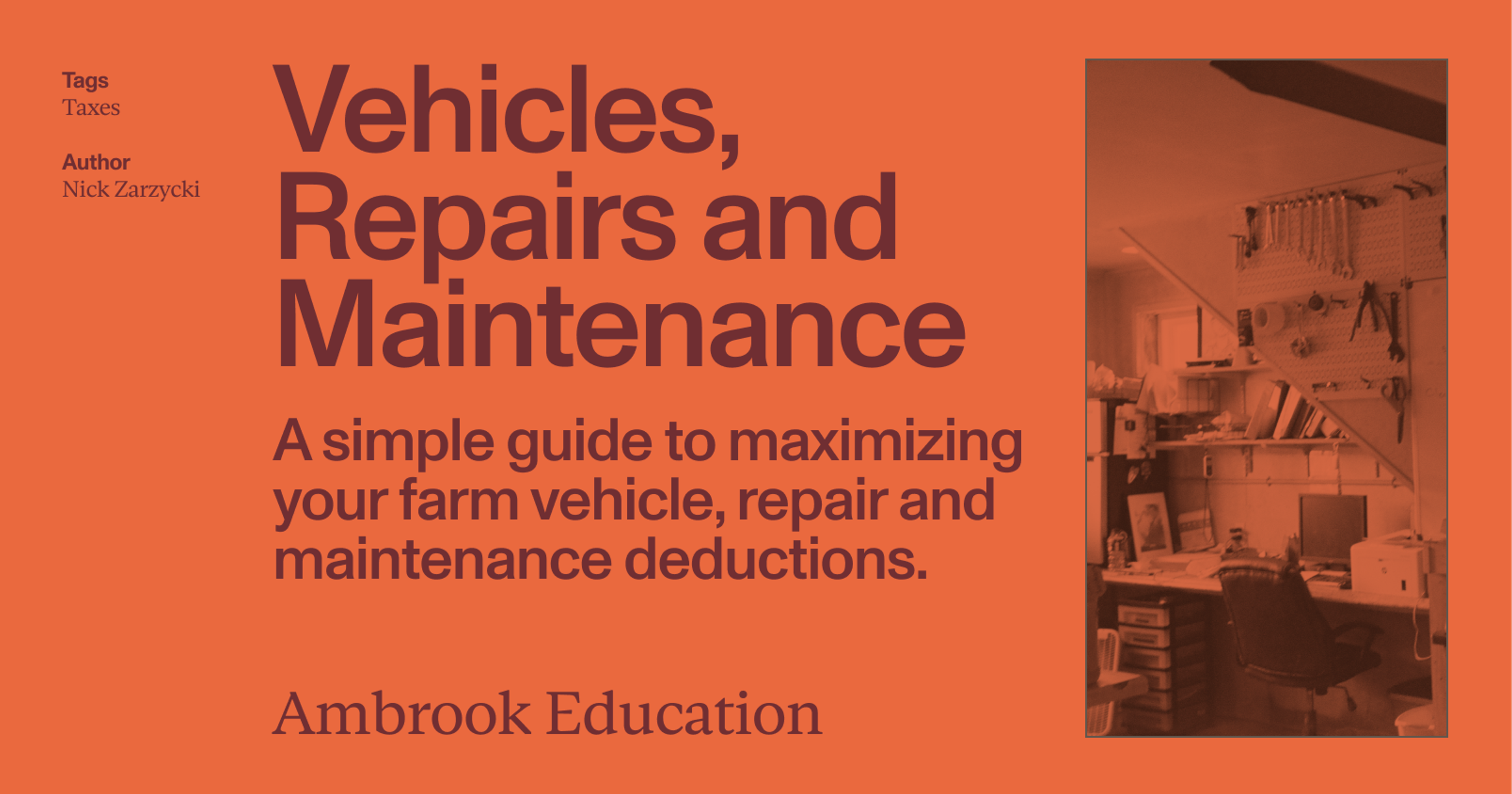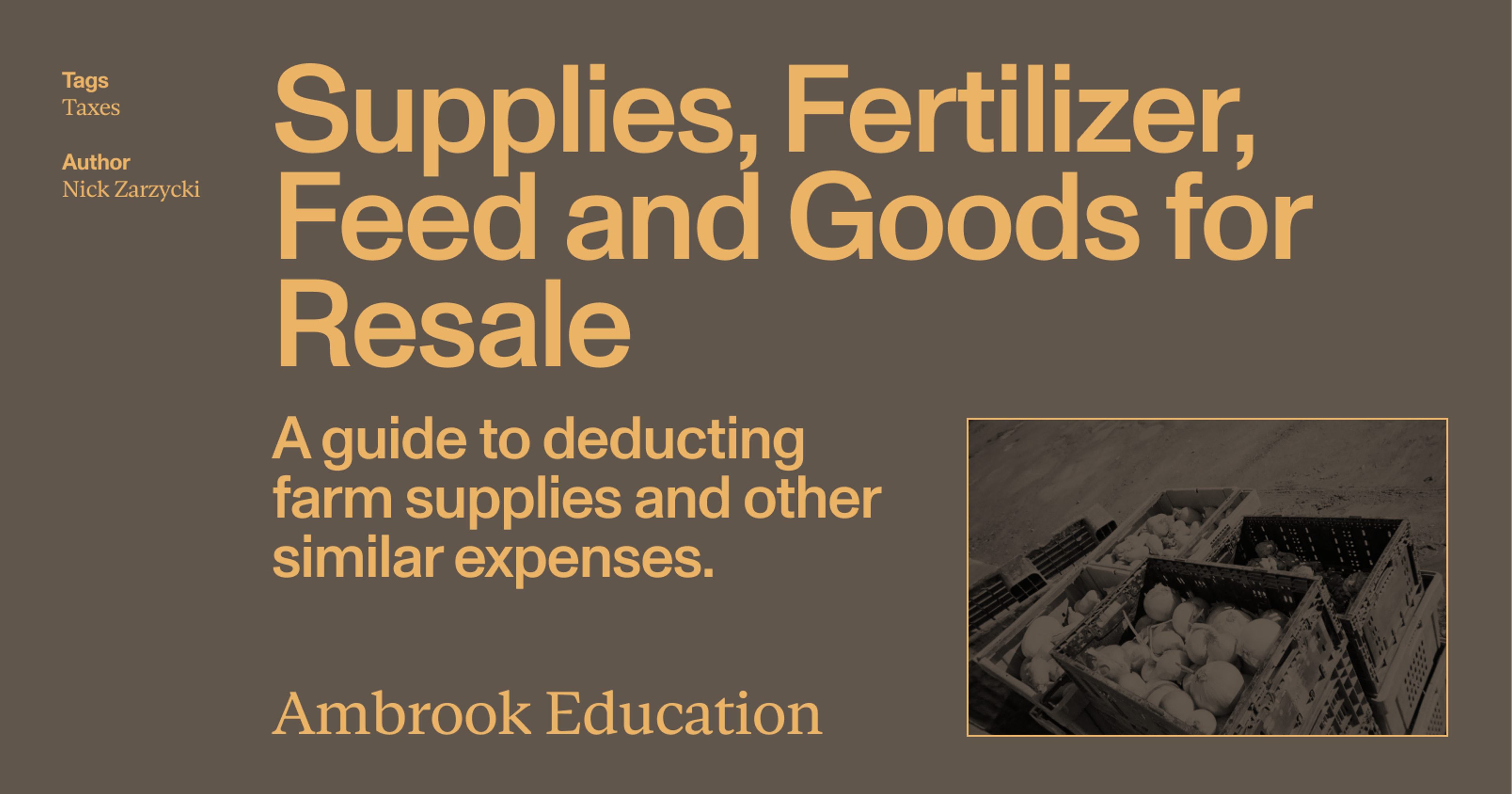Provided they’re clearly separated from your personal expenses, your overhead costs can be a great place to look for tax-saving deductions.
Whether you’re just starting up and formalizing your operation, getting professional help from agronomists or veterinarians, trying to grow with sales and marketing, or simply trying to keep the lights on, the business of farming can incur many overhead costs.
Here we’ll review which expenses you can and can’t deduct, how to make sure you’re claiming them properly on Schedule F, and how to maximize your overhead-related deductions.
Looking for a different farm tax deduction? Start here.

Business Start-up Costs
These are expenses you incur or pay before your business officially gets going, while doing things like:
Investigating the “creation, acquisition, or establishment” of your business, which might include conference fees, travel expenses, and consultant fees.
Setting up the farm business itself, including the cost of registering the name of your farm, incorporation costs, and legal fees.
These expenses generally cannot be deducted and must be amortized over 15 years (180 months), however farmers may deduct up to $5,000 of these costs using a special election, which they can make by attaching a detailed description of the start-up costs to a timely filed tax return.
If the total value of these start-up expenses exceeds $50,000 for the year in which the business begins, this $5,000 cap is reduced dollar for dollar by the excess amount above $50,000.

Professional fees
Fees you pay to consultants, lawyers, accountants, agronomists, and other professionals for services related to your farming business are generally deductible.
Farm-related attorney fees are deductible provided that they’re related to earning a profit in farming – for example, if you hire a lawyer to help negotiate a contract with a supplier. Fees you spend on legal services related to personal matters – like setting up an estate plan, for example – are not deductible.
Accountant fees for services like tax preparation are also deductible provided they’re for business purposes. If you use the same accountant for your personal and business accounting, ask them for an itemized bill and only deduct the business portion.

Medicine, veterinary and breeding fees
Veterinary expenses are also generally deductible, including the cost of surgeries, medicine, vaccinations, and other medical expenses related to the farm production cycle.
You can generally deduct breeding fees if they don’t come with a live offspring guarantee. If they do, you treat those costs like an asset and capitalize them as the cost basis of the offspring instead. However, if the fees fall below the de minimis threshold (see below) you might still be able to deduct them.

Education Costs, Memberships, and Publications
Farming-related university and college courses, seminars, online workshops, professional conferences, textbooks, and other education expenses are generally deductible. If these education expenses prepare you for a different or new trade, however, they’re not deductible.
Professional memberships, farm magazines, subscriptions to farming publications, and other agriculture-related trade publications are also generally deductible.

Advertising and Marketing
Print advertising fees, online ads, production costs for physical marketing materials like brochures, coupons, and pamphlets, trade show fees, website development costs, and other expenses related to advertising or marketing your farming business are generally deductible.

Business Use of the Home
Buying or renting a home is generally considered a personal expense. However, if you use part of your home as an office, you might be able to deduct some of those costs, provided that this part of the home is used exclusively and regularly for business.
To qualify as a home office this area must also be your principal place of business, and you may not have a second location where you conduct a substantial portion of your administrative or management activities.
Farmers can use either the actual expenses method or the simplified method to calculate the deduction.
1. Simplified method
Under this method, you multiply the total area of the home office in square feet by the prescribed rate from Publication 587, which is currently $5 per square foot. If your home office is 200 square feet, for example, you could deduct $1,000 using the simplified method. The maximum area allowed is 300 square feet.
2. Actual expenses method
Under the actual expenses method, you can deduct expenses directly associated with running and maintaining the office, like repairs, office supplies, and stationary. For expenses that have both a personal and a business use, like utilities, insurance, and taxes, use the business percentage to calculate the deduction.
Unlike the simplified method, you may use any reasonable method to calculate this percentage, so long as you’ve kept the appropriate records. While this might result in a larger deduction than the simplified method, it might also involve a lot more recordkeeping.

Telephone, Internet and Utilities
You can deduct telephone, internet, cell phone, and other utility expenses, but only the portion you use for farm business. You generally can’t deduct the cost of the first telephone line in your home, however you may deduct a second line used exclusively for business.

Computer Software
How you deduct software expenses will depend on a few factors, namely whether the software is purchased together with accompanying hardware, and whether you purchased the software outright, or as part of a subscription plan, like a software as a service (SaaS) agreement.
If you purchased the software outright and it has a useful life of more than 12 months, you’ll have to capitalize and depreciate it. If it’s bundled with hardware, you’ll also have to depreciate it (however, remember that computer hardware purchases can be written off using Section 179).
If you pay a subscription fee or use the software as a service, you can treat that as a rent expense and deduct it. Accounting, bookkeeping, productivity, and other management-related software tools like Ambrook are usually deductible as business expenses.

Rent
Any rent you pay for property that you use in your farm business is generally deductible, however you may not deduct the portion of rent you pay for the farm home in which you live.
You also can’t deduct rent you pay in crop shares if you’ve already deducted the cost of raising those crops, and you may only deduct advance payments of rent in the year to which they apply.

Insurance
Premiums paid for the following types of insurance are usually deductible as a business expense (provided they’re for your farming business):
Fire, storm, crop, theft, and liability insurance
Health and accident insurance for employees
Workers‘ compensation insurance
Business interruption insurance
State unemployment insurance
You can only deduct advance payments of insurance premiums in the year to which they apply. Life insurance for you (the business owner) is generally not deductible as a business expense.

Taxes
Real estate and property taxes you pay on farm business assets such as equipment, animals, land, and buildings are generally deductible, however taxes you pay on the part of the property that you use as a home cannot be deducted. This allocation is usually based on the assessed value of each part of the property.
Some taxes related to operating motor vehicles or tractors, such as highway use taxes, are generally deductible. (See our guide to farm vehicle deductions for more.)
State and local general sales taxes you pay on farm expenses are also deductible, however if the taxes are imposed on an asset you purchase for use in your farm business, include them in the cost you depreciate instead.
State income tax, federal income tax, and self-employment tax cannot be deducted as a farm business expense.

What to know before you start deducting
1. Make sure it’s a business expense
According to the IRS, you can only deduct expenses that are “common” and “necessary” in your line of work. Deducting expenses you use for both business and personal purposes (i.e. vehicles and equipment) often requires extensive recordkeeping in the form of activity logs, and also some proof that they’re directly associated with your business.
2. Know the hobby rules
You can’t deduct any expenses if the IRS determines you’re a non-profit or ‘hobby’ farm. This can happen if you fail to earn a profit in 3 of the last 5 years, which is when the IRS comes in to take a closer look and determine a profit motive. If you fail the profit test, however, you might be able to postpone this process by filing IRS Form 5213.
You can find a list of factors the IRS considers in the ‘Not-for-Profit Farming’ section of the IRS Farm Tax Guide.
3. Separate farming from non-farming
Remember that not all of the income earned on a farm is considered “farming income” for tax purposes.
Processing farm commodities (e.g. wine and cheese-making, butchery, canning, jamming) is not considered farming by the IRS. Providing farming services like custom harvesting, trucking commodities to market, agritourism and running an events space also don’t count.
For more, check out our guide to who is and isn’t considered a farmer for tax purposes by the IRS.

Looking for a different farm tax deduction?
We’ve gathered the most popular farm business deductions into one easy to read guide. Check out the introduction or dive into the relevant section below.
Part 1: Vehicles, Equipment, Repairs and Maintenance
Part 2: Supplies, Fertilizer, Feed and Goods Purchased for Resale
Part 3: Wages, Benefits, Business Travel and Meals
Part 4: Overhead, Fees, Taxes, Office Expenses and Utilities
Maximize Your Deductions with Ambrook
Ambrook’s Schedule F category tags are tailor-made for farming businesses, saving you hours of work during tax season and making it easy to double-check your records for potential deductions. With features like automated financial reporting, simplified bookkeeping, and effortless bill pay and invoicing, Ambrook is more than just a farm tax and accounting tool: it takes the guesswork out of running your business. Want to learn more? Start your 7 day free trial today.
This resource is provided for general informational purposes only. It does not constitute professional tax, legal, or accounting advice. The information may not apply to your specific situation. Please consult with a qualified tax professional regarding your individual circumstances before making any tax-related decisions.





